New City Sales Tax Compounds Challenge Recruiting Police and Fire Fighters
Under Act 12 Milwaukee could lose funding if it can't hire enough recruits.
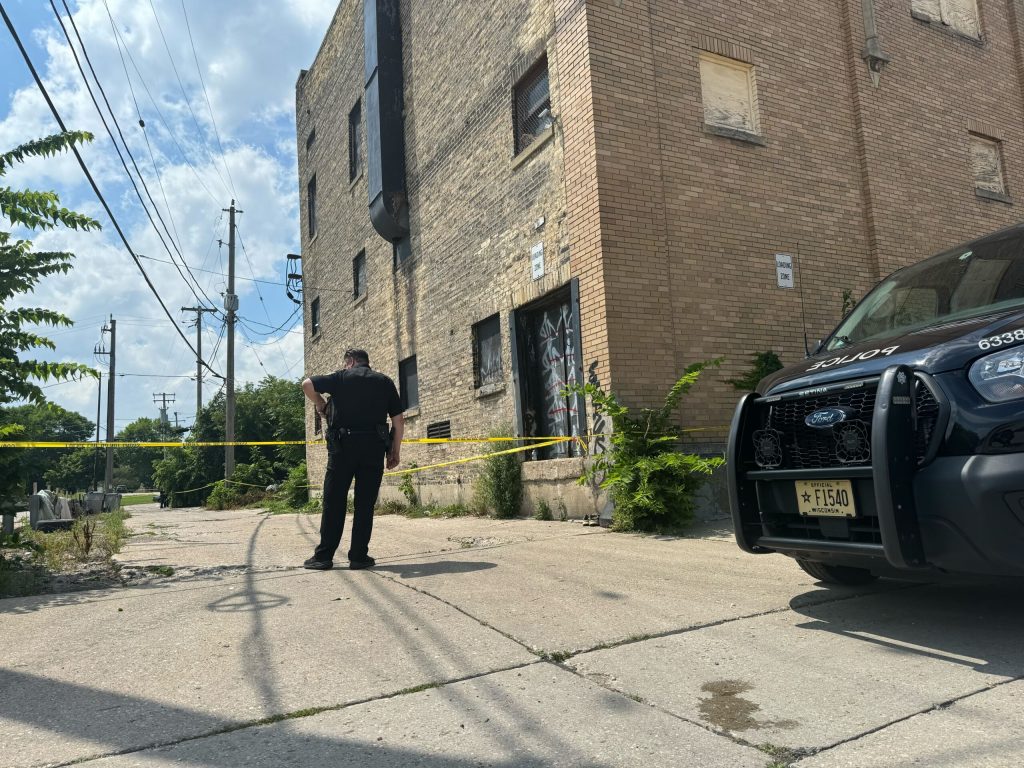
The Milwaukee Police Department has to increase its staffing level due to Wisconsin Act 12. (Evan Casey/WPR)
Alexander Panic always wanted to be a cop.
After a 15-year career in IT, he decided to take the leap and pursue his lifelong dream.
“It’s a noble profession,” Panic said. “I always looked up to police officers, and I just wanted to serve our community.”
But the auditorium could have been even more crowded. His class was budgeted to include 65 recruits.
Panic joins a police department faced with the difficult task of recruiting and retaining officers when fewer people are interested in joining the profession. Meanwhile, a bipartisan law to overhaul local government funding has placed pressure on the city of Milwaukee to hire more police officers and firefighters in the coming years.
If the Milwaukee Police Department and Milwaukee Fire Department do not maintain staffing levels year over year, the city risks losing 15 percent of its shared revenue allotment from the state. Those departments are also tasked with increasing their staffing levels by 2034 under the law known as Act 12.
The state mandate comes as over 900 police officers and over 600 firefighters in Milwaukee have left their jobs in the past decade.
“It is so vital to hit our MOE (maintenance of effort), because if we don’t, we won’t have the money to have an adequately funded police or fire department,” Milwaukee Alder Scott Spiker said during a recent city meeting.
Milwaukee Police Department must have 1,725 officers by 2034
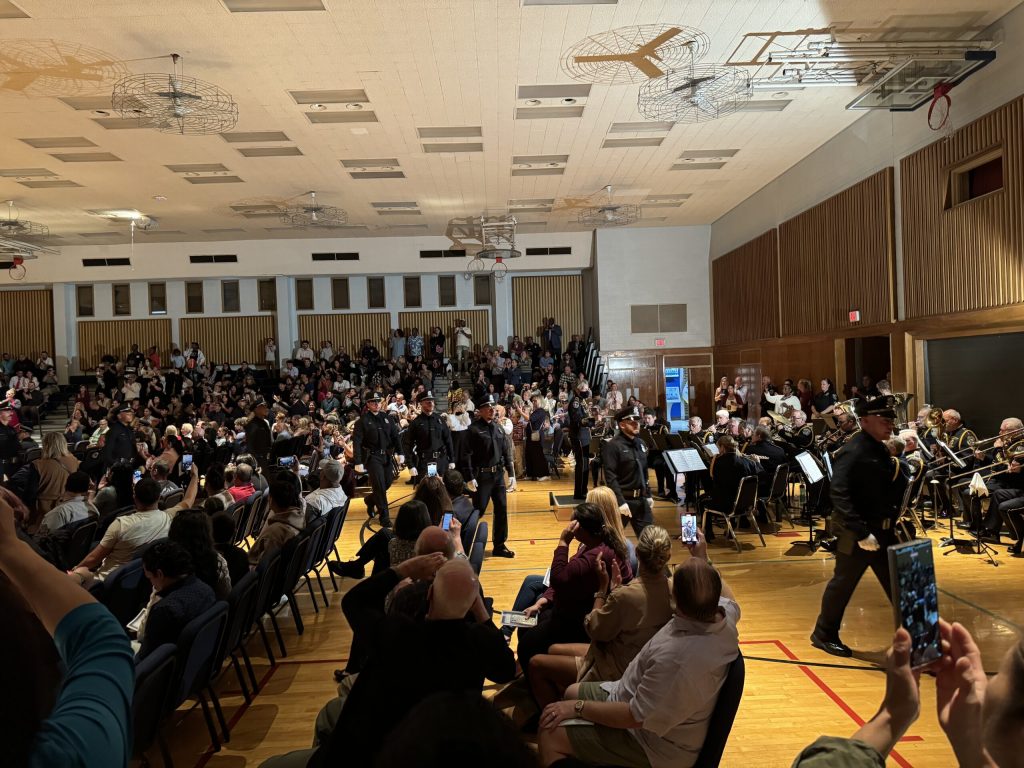
New police recruits with the Milwaukee Police Department take part in a graduation ceremony on Thursday, Oct. 3, 2024. Evan Casey/WPR
There are currently 1,567 sworn police officers in the Milwaukee Police Department and 199 sworn daily firefighter positions in the Milwaukee Fire Department. Both departments can’t dip below that number next year, according to the provisions for Milwaukee in Act 12.
For the fire department, the city must maintain a “daily staffing level not fewer than 218 members of the paid fire department” by 2034, according to a Wisconsin Legislative Council memo. City budget director Nik Kovac said the fire department will have a daily staffing level of 207 next year.
The city budgeted for three recruit classes of 65 police officers in the 2024 budget. However, only 37 recruits had graduated from the academy and into the department as of early November.
Leon Todd, the executive director of the Milwaukee Fire and Police Commission, said another recruit class started with 32 recruits in August.
“If we want to add officers, we’re going to have to get the numbers up,” Todd said during a Milwaukee public safety and health committee meeting last month.
The city’s 2025 budget calls for another three recruit classes of 65 police officers.
Fewer people sticking with police application process
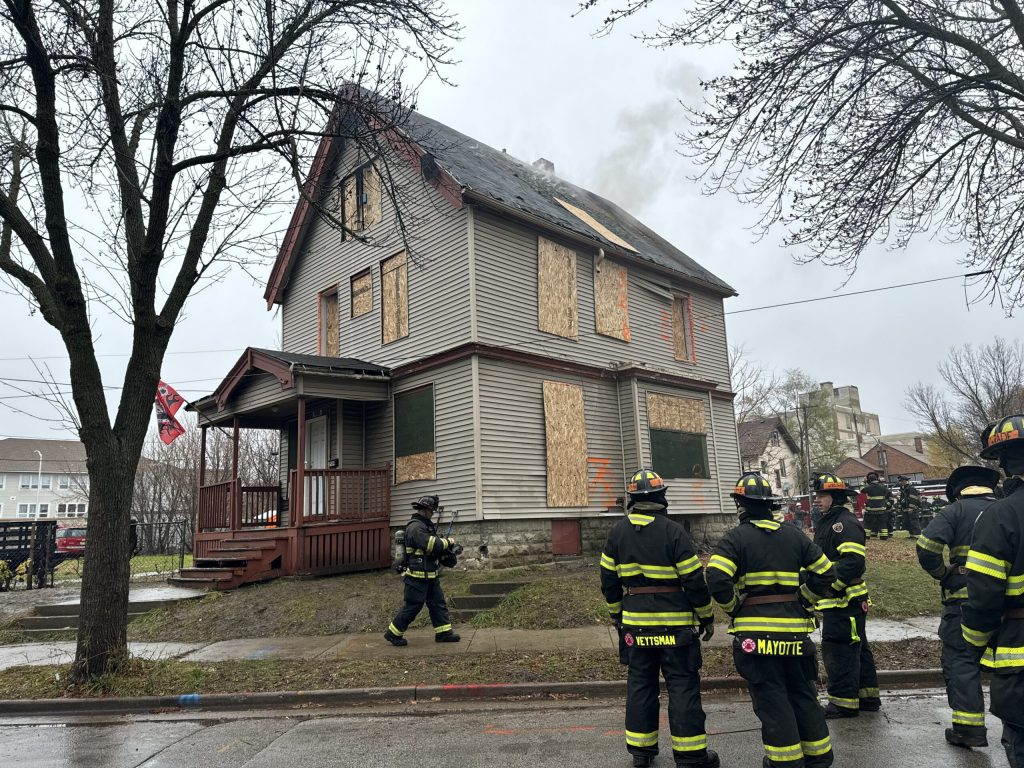
New recruits with the Milwaukee Fire Department take part in a training exercise on the city’s north side. Evan Casey/WPR
The Milwaukee Fire and Police Commission is in charge of hiring officers for the police and fire department. When someone applies to be a police officer, they have to pass a written and oral exam, physical readiness test, background check and a psychological examination. Then, they’re enrolled in the academy, which takes around six months to complete.
However, Todd said more than 50 percent of applicants for the job do not show up for the written test.
“The biggest drop off points that we see are … people not showing up to take the initial written test, which is the first step in the process,” Todd said during the committee meeting.
Other applicants drop out at other points of the process, fail other exams or evaluations or don’t meet the minimum requirements for the career.
“All of the exam components that we have, I think, are necessary and appropriate and passing points are appropriately set,” Todd said at the meeting.
Todd said the commission sends text messages and reminders about the written test and also offers prep sessions, but it doesn’t help that there are fewer people interested in the career across the nation.
“That also translates into fewer people that are serious candidates, so to speak, or that are going to have that follow through,” Todd said.
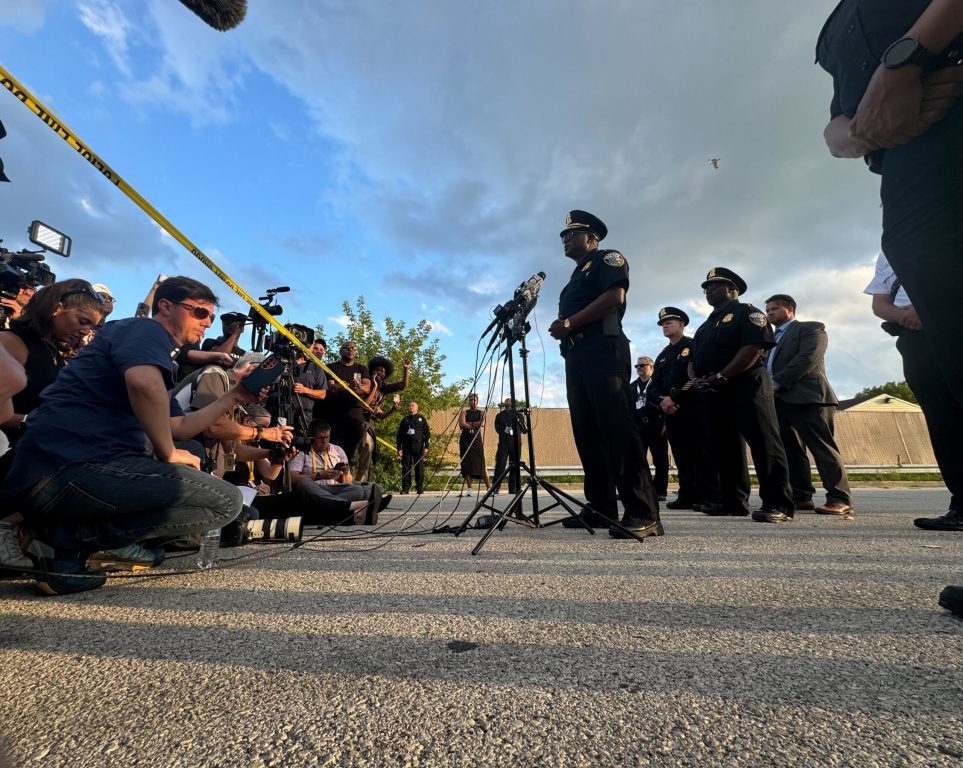
Milwaukee police chief Jeffrey Norman speaks at a press conference in Milwaukee on Tuesday, July 16, 2024. Evan Casey/WPR
In order to grow the size of the department, he said the commission has increased recruitment efforts to get more applicants. He also said the commission is moving to a new online provider for the written test in an effort to get more people to take it.
An applicant has to be at least 20 years old when they apply, be a U.S. citizen and have a high school diploma or Wisconsin GED. They will be disqualified from the process if they’ve ever been convicted of a felony, been “dishonorably discharged” from the military or if they’ve been convicted of a misdemeanor domestic violence crime.
Todd said they’ve added a recruiter to help with some of the shortfalls. Ralph McClain, a 15-year veteran of the department, has been a recruiter for the past five years. While talking to candidates for the job, he tries to emphasize the role is “more than an officer.”
“It’s also letting them know that we hear the concerns of others, and we are here to give resources when it comes to various concerns of the community,” McClain said.
The goal, he said, is to “humanize the badge.”
“We want to let people know that we’re more than just an officer. We’re just like them, and we’re here to assist,” McClain said.
Retirements creating a ‘structural issue’
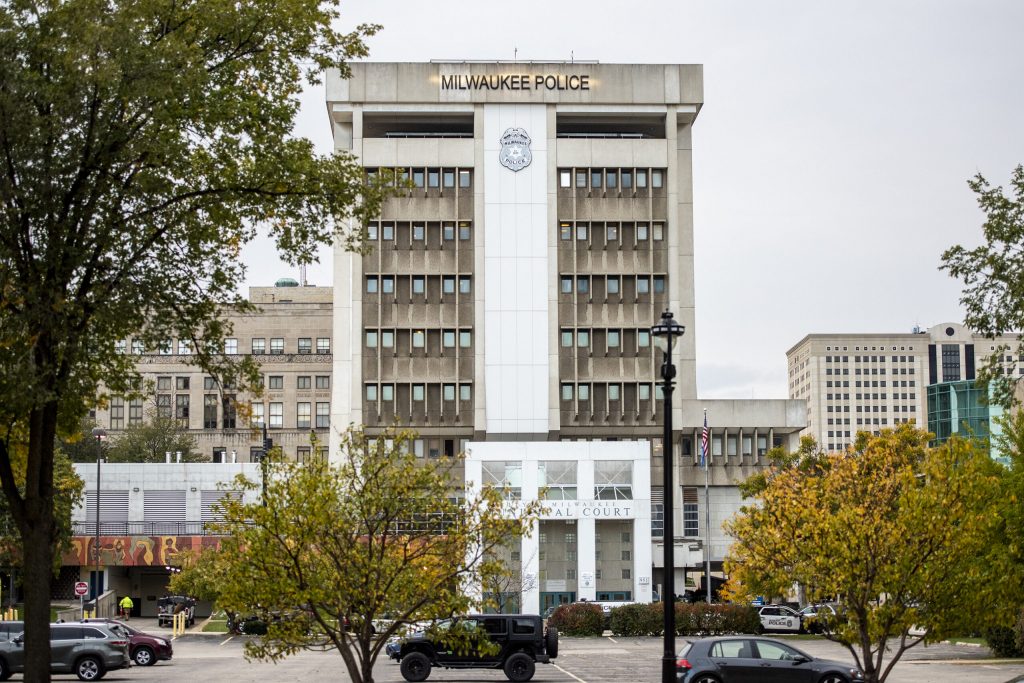
The Milwaukee Police Administration Building on Thursday, Oct. 13, in Milwaukee, Wis. Angela Major/WPR
From 2013 until Oct. 29, 2024, 909 officers left the Milwaukee Police Department due to termination, retirement or resignation. The majority — 462 — were due to “normal retirement,” according to records obtained by WPR.
Those retirements have ramped up from 48 from 2012 to 2014, to 155 from 2020 to 2022.
Over the last decade, hiring hasn’t kept up with turnover. Since 2013, only 821 officers graduated from the Milwaukee Police Academy and started with the department.
For the Milwaukee Fire Department, 628 sworn firefighters left the Milwaukee Fire Department from 2013 to Nov. 13, 2024. During that same time period, only 520 firefighter recruits were hired into a firefighter class.
Ari Brown, a senior research associate with Wisconsin Policy Forum, said that’s a real issue for the departments.
“You have large groups of individuals who are hitting retirement age in the fire department, hitting retirement age in the police department — that, in of itself, is just going to create a structural issue,” Brown said.
Brown also said wages for the Milwaukee Police Department are similar to other suburban police departments in the Milwaukee area.
“When you have the level of activity and stress that comes along with policing in the city of Milwaukee, folks might turn towards suburban departments before they turn to the city, if police officer is their desired career,” Brown said.
Meghan Stroshine, an associate professor of criminology and law studies at Marquette University, said beyond retirement, more officers across the nation are leaving the career because of dissatisfaction. She said there’s also fewer young people wanting to be police officers.
“I think that repairing the trust between the police and the public is probably what needs to happen in order to facilitate a different outlook on the occupation,” Stroshine said.
The Milwaukee Police Department isn’t alone in dealing with issues related to recruitment. A 2019 report from the International Association of Chiefs of Police found there is a “recruitment crisis” at departments across the nation.
“Overall, a majority of police officers feel their jobs have gotten more difficult since high-profile use-of-force incidents have dominated the national conversation,” that report found.
That report came out before the protests and unrest in 2020 following the police murder of George Floyd in Minneapolis. A survey of police departments from the Police Executive Research Forum showed a decrease in hirings and increase in resignations in 2020 and 2021.
“I think there will come a time where recruitment becomes easier, but I do believe there has to be a fundamental change in the relationship between the police and the public for that to happen,” Stroshine said.
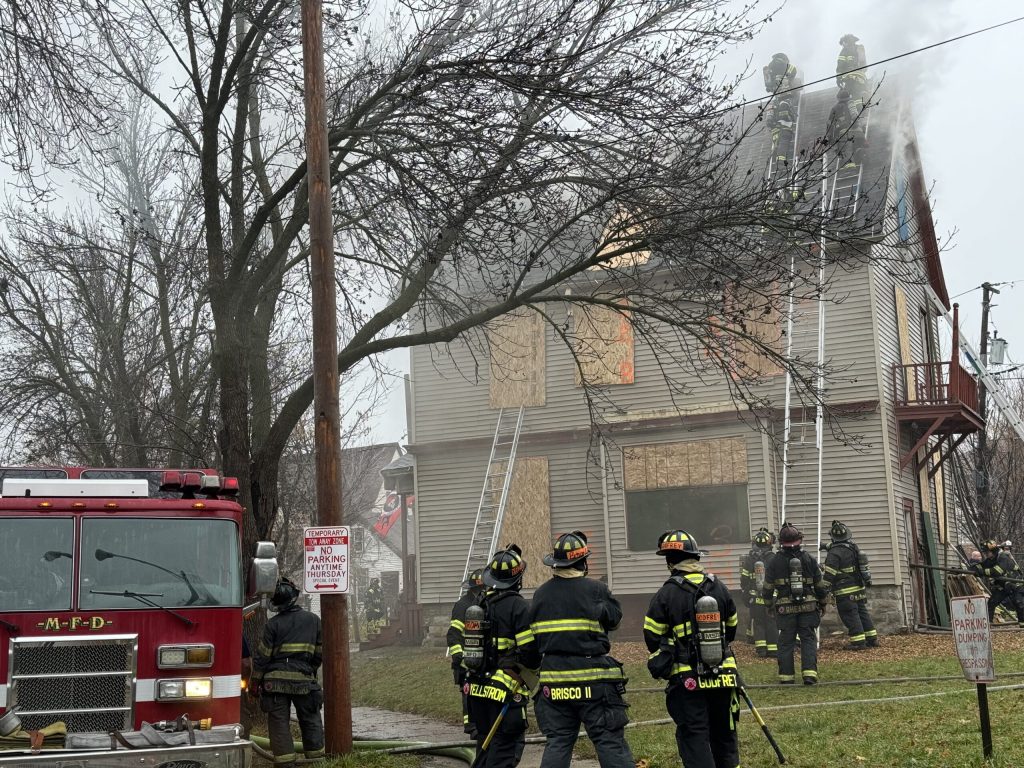
Firefighter recruits with the Milwaukee Fire Department take part in a training opportunity on Thursday, Nov. 14, 2024. Evan Casey/WPR
On a rainy Thursday, Joshua Parish, assistant chief of the Milwaukee Fire Department, watched new fire recruits fight a fire during a training on the city’s north side.
Parish said the fire department has capacity for 50 new recruits in each class. He said they graduate two classes each year, with this class having around 30 recruits.
In Milwaukee, firefighter recruits also get trained to be Emergency Medical Technicians. But Parish said the career might not be for everyone.
“One of our bigger challenges is making sure that candidates on the (recruitment) list are prepared to do this, both physically and cognitively,” Parish said.
Wisconsin’s shared revenue law creates recruitment challenge for Milwaukee police, fire departments was originally published by Wisconsin Public Radio.
If you think stories like this are important, become a member of Urban Milwaukee and help support real, independent journalism. Plus you get some cool added benefits.


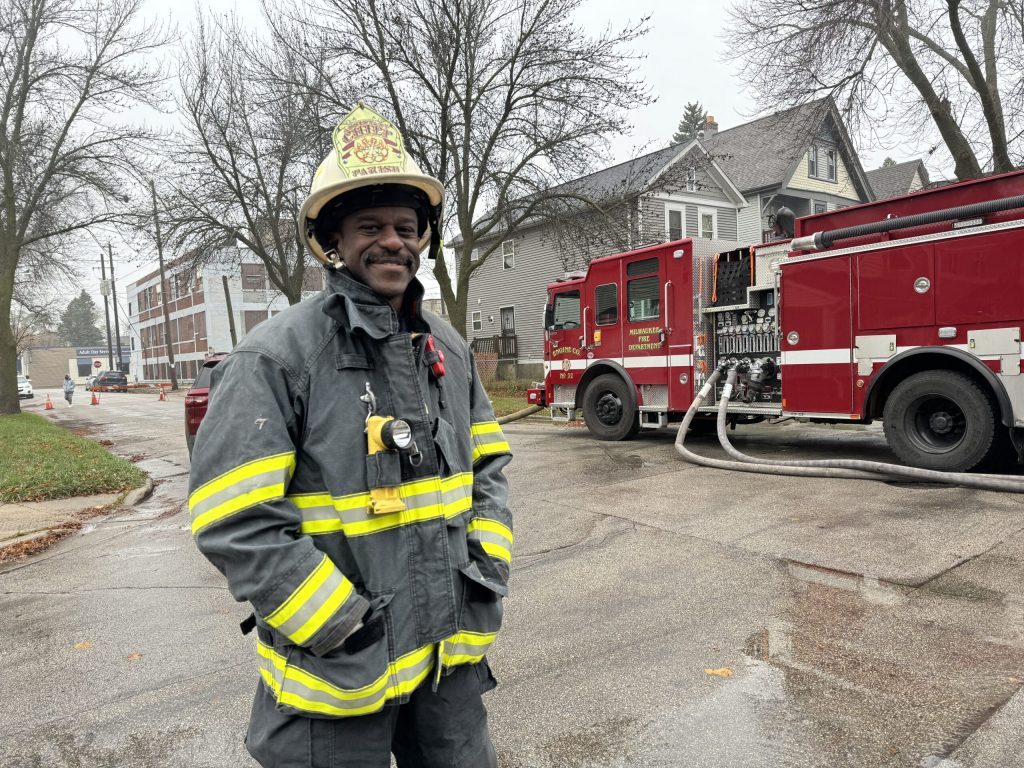




















I think residents in rural areas would strongly resent Milwaukee area legislators order them on to how to staff their fire and police departments. Yet their elected representatives are telling Milwaukee how to staff their protective services. I always find it interesting on how available medical services are diminishing along with hospital closures in these areas and local schools are closing while their elected representatives tell Milwaukee how to run their city. Residents in these rural areas keep on electing these Senators and Assembly representatives who do very little to improve quality of life services in these areas.
Our Rotary Club recently held a special meeting with Western Lakes Fire District at one of their facilities, which was a very educational and relationship building experience, which can help in increasing awareness of fire department careers.